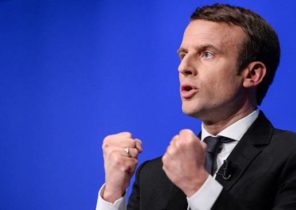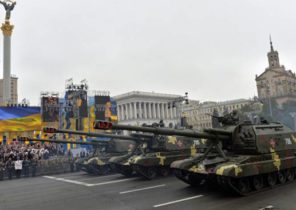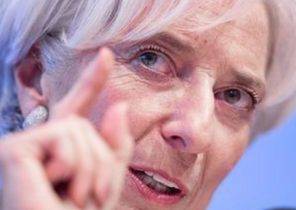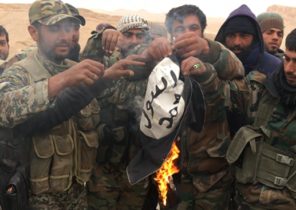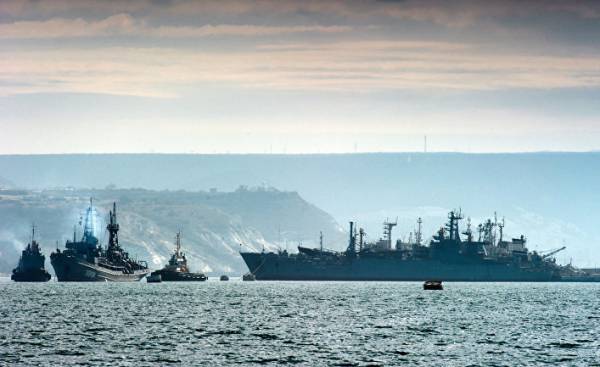
The main items on the agenda of the Munich security conference, held this year in 53 times, was the election of Donald trump President of the United States, the separation of the UK from the EU, the search for peace in Syria, commercial and military developments in the Asia-Pacific region.
At this conference, continued bickering between Russia and NATO members. The thesis of “the cold war is not over” in the speech of the Minister of foreign Affairs of Russia Sergey Lavrov at the conference was important from the standpoint of promoting global balances. Trump during his election campaign spoke of NATO as a “legacy organization” and it must be encouraged by Russia. However, Vice-President Mike Pence, who took part in the conference on behalf of the us administration, gave a strong signal of NATO’s support and noted that the US does not recognize the occupation of Crimea by Russia. His words did not justify the hopes of Moscow.
At the summit of NATO defence Ministers, which took place around the same time in Brussels, was an important decision that could affect the future relations of NATO and Russia. With the acceptance of the proposal to increase the US military presence in the Black sea in this region will come more NATO ships. Command control of these vehicles will be from the base MARCOM, which is in the UK. To this solution was the reason for the growth of tension in relations with Russia, Turkey has put a condition to her beforehand notified about the movement of ships. It is assumed that this practice would begin in may 2017.
Adopted at the meeting of NATO defence Ministers in October 2016, a plan for deploying four battalions in Estonia, Latvia, Lithuania and Poland to strengthen the Eastern borders of the Alliance against Russia entered into force in February 2017. When the Putin administration has expressed concern about the creation of NATO military bases in Baltic countries after 2004, she actually foresaw the present day and has taken steps in this direction.
Security doctrine Putin
Since the beginning of 2000-ies of the EU / US are focusing on the new political configurations in Georgia, Ukraine and Kyrgyzstan. Russia also considered this strategy as a policy to weaken Russia. After all, these three countries have occupied an important place in the framework of the Eurasian project, which Russia was trying to create. The conduct of these countries in favor of NATO and the EU would weaken the idea of Eurasianism. Putin, speaking at the Munich security conference on 10 February 2007, outlined the framework of the new foreign policy of Russia. Subsequently, this statement was called the “Munich doctrine.” It included the following points: the unacceptability of a unipolar world; the need to confront the global hegemony of the United States and their attempts to impose their conditions; the use of military force only in the framework of the relevant decisions of the UN Security Council.
In the Munich doctrine, Putin announced that Russia, a country with millennial history, which has always pursued an independent foreign policy, will never submit to threats, will not accept attempts environment and will adequately respond to these challenges. Putin’s Munich speech also outlined the first signs of problems which, in our days, was initiated by Russia. But the US and the EU is not regarded this statement as a threat from Russia and did not take measures in this direction.
In Putin’s speech at the Munich security conference on 10 February 2007 was designated the main directions of foreign policy which Russia is pursuing in our day. After the presentation, Putin, going into action, intervened, first to Georgia and then to Ukraine, to Crimea and Syria. Moreover, after the Munich speech of July 15, 2008 in Russia was declared a new foreign policy concept. This document and the recognition of independence of Abkhazia and South Ossetia after the Georgian crisis, Russia responded to the proclamation of Kosovo’s independence from Serbia on 17 February 2008. Thus, Russia in a sense was an ultimatum to the USA and EU countries.
NATO expansion and counter moves of Russia
In the period after 2008, Russia took advantage of the fact that President Obama pursued a passive policy in its regard. Putin, describing US policy under the leadership of Obama as “inertia” and “helplessness” began to provide himself room to maneuver.
Russia’s intervention in Georgia in 2008 resulted in the definition of new strategies in the West and in Russia. 5 Feb 2010 the Russian side has adopted a new military doctrine. The biggest threats were called separatist movement in the North Caucasus, as well as the expansion of NATO to the East. In response to NATO expansion, Russia has initiated the establishment and strengthening of the Eurasian economic Union, the organization of collective security Treaty and the Single economic space and other similar organizations. The expansion of NATO to the East and the approach of the Alliance to the Russian borders, Russian military doctrine has identified as a clear threat to security. Putin, mindful of the fact that tsarist Russia and the Soviet Union formed its own sphere of influence by acquiring new territories, and wished again to dominate the near abroad.
Russia will not relinquish Crimea and Tartus
In the framework of implementation of priority tasks announced by Putin in 2007 Munich speech, Russia did not hesitate to join the Crimea, which she considered as the basis of the presence in the Black sea. In the future, intervening in the Syrian crisis, it guaranteed the preservation of its base in the port of Tartus. Russia, unwilling to lose its geopolitical supremacy in Eastern Europe, Black sea, Caspian sea and Central Asia, expects to literally “push” the opposing forces.
The access to ports in warm seas — the eternal ideal of Russian geopolitics. At the same time, the geopolitical concerns of Russia can not be called unfair. Its geopolitical and geostrategic position in the international system of Putin’s Russia is built on the basis of creating a new balance of power. Attempts to present Russia as a world power everywhere reveal the tools and arguments of the Russian strategy.
Black sea and Ukraine once again heats up
Russia is trying to take action against the project Eastern partnership (Eastern Partnership), initiated by the US and the EU for the countries of Eastern Europe. In this regard, in particular, formulate policies aimed at reducing political, economic, social and cultural influence of Poland, a satellite of the EU and the United States, Ukraine and Belarus. In addition, as a result of the project “Eastern partnership” affected energy policy and security of Russia. Through the project “Turkish stream” Russia, in fact, trying to ensure its energy security.
While in the Soviet period, the only ally of the West in the Black sea was Turkey, a NATO member. Later, with the accession of Bulgaria and Romania in 2004, to NATO and in 2007 to the EU, the Black sea was in the area of influence of the West. NATO enlargement with the inclusion in the Alliance such overlooking the Black sea countries like Romania and Bulgaria, has caused concern in Russia. Prior to 2008, when Russia was weak economically and militarily, she didn’t react to this situation. And in 2008, on the backdrop of the Georgian crisis, she again stepped up its policy in the Black sea.
The strategic priorities for Putin in the Black sea
Operation in Syria, Russia wanted to preclude the attempts of containment and oppression, which at the political maneuvers of the United States were made against her through Europe. During the reign of Obama, she managed it. At a time when the US image in the middle East has been significantly damaged after the war in Iraq, Russia has presented itself as a “deliverer, which is fighting terrorism” in Syria. Russia, acting in the framework of new perspectives on the middle East, took advantage of the weakness of the Iranian expansionism and moved the Russian-Iranian strategic Alliance to a level at which the States of the region would be forced to solve the dilemma of accession / non-aligned. In fact, for each country in the region, this policy made Russia such a state, with which it is necessary to establish communication, but with the election of President trump balances may again change.
In response to US policy in the Black sea, Russia sees Ukraine as a geopolitical axis on the Eurasian chessboard. Especially the Russian naval base in Crimea is seen as a guarantee of its presence in the Black sea. Although the US and the EU wanted Turkey served as a kind of shield against Russia, the rapprochement between Moscow and Ankara has recently become an impediment to this. The main reason why Putin and President Erdogan are exposed to such attacks from the West, — the desire to destroy this cooperation. But the greatest danger that stands in the way of development of Russian-Turkish relations, is that the friendship of the two countries is limited to the initiative of Erdogan / Putin. No one can predict what will happen to the two countries in the future.
Russia needs the Black sea for the sale of oil and gas
Ukraine and Crimea are vital not only for the security of the Black sea, but also for the supply of Russian natural gas. One of the main reasons for the interest of Russia to the Black sea, undoubtedly, is that pass through the region, the routes of transportation of oil and gas resources.
For Russia, the security of the Black sea is at the same time, the security of the Caucasus. Russia fears that if she fails to take under the protection of the Black sea, the West will do so that the crisis will spread to the Caucasus.
Russia is also concerned that the US is increasing its military presence in Georgia, can use this region in terms of tensions with Iran. Intervention in Georgia in 2008, Russia has undermined the process in which works on NATO expansion continues apace, and the United States were busy finding military bases in Romania and Bulgaria, facing the Black sea. But the decisions taken at the summit of heads of state and government of NATO countries in 2016 and the summit of defense Ministers related to the transfer of military bases in the Baltic countries and increased military presence in the Black sea, able to cause a new wave of tension. For example, Iran is also believed that after the military buildup of NATO in the Black sea, these bases can be used in a possible operation against Iran.
Along with the fact that, with the promise that trump gave during his election campaign, expected some improvement in relations between the US and NATO with Russia, recent developments indicate that the coming period may lead to new tensions, especially in the Black sea.

